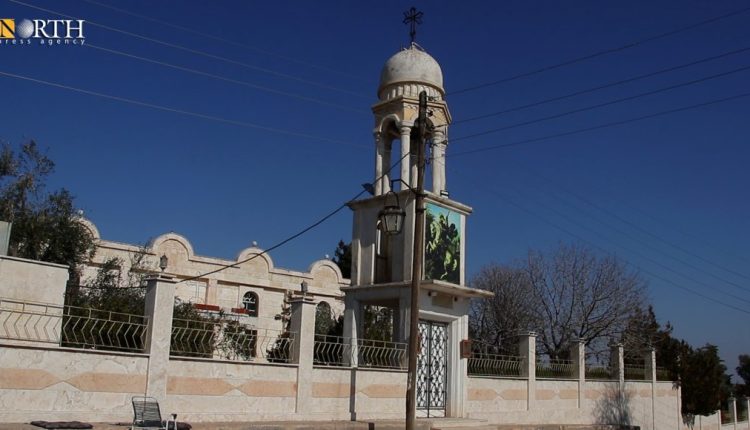
QAMISHLI, Syria (North Press) – In the quiet halls of Mehrkan church in the eastern countryside of Qamishli, northeastern Syria, Aziz Hanna walks alone, opening its doors one by one. He recalls a time when Syriacs filled the village, their presence shaping its identity. “Now, only 14 families remain,” he says. “The rest have left.”
In early 2015, ISIS launched an assault on Christian villages along the Khabur River in the town of Tel Tamr, north of Hasakah. The group seized 33 Assyrian villages and destroyed seven churches, including the Church of the Virgin Mary in Tel Nasri. The attack forced many Syriacs and Assyrians to flee, fearing a repeat of the massacres they had suffered throughout history.
A Legacy of persecution
Hanna, a resident of Mehrkan village northeast of Qamishli city, tells North Press that the Syriac community has endured persecution and massacres for decades.
The Ottoman Empire’s Sayfo genocide in 1915 targeted Armenians and Syriacs alike. More recently, in October 2021, Turkish forces and their affiliated factions shelled northern and eastern countryside of Tel Tamr, emptying four Assyrian villages.
“Our village once had over 80 Syriac homes,” Hanna explains. “But most of the community emigrated long ago, fleeing killings and forced displacement.”
Even under the rule of the former Syrian regime, he adds, Syriacs were denied their full rights. He calls for a new political system in Syria that protects the Syriac language and culture. “Our only demand is to live in peace and have our rights secured, along with all other communities in Syria.”
The Syriacs remain a key component of northeastern Syria’s society, and since 2015, their language has been recognized as an official language alongside Arabic and Kurdish in the education system of the Autonomous Administration of North and East Syria (AANES).
Holding onto identity
A few meters from his home, George Malke, a Syriac farmer in the town of Tirbe Spiyeh (al-Qahtaniyah), continues working his land—one he inherited from his parents. Though most of his village has emptied, he refuses to leave.
“After the fall of Bashar al-Assad’s regime, we expected change, but so far, we have seen little from the new administration,” Malke tells North Press.
As a Syriac, he demands recognition of his community’s language and culture. “Our language is the language of Christ,” he asserts.
Malke also insists that Syriacs must have representation in Syria’s future, including the right to help draft the constitution. “There must be no discrimination between Syria’s communities—we need a new, inclusive Syria that guarantees everyone’s rights.”
Nearby, Khamri Issa from Gersheiran village echoes a similar call. He emphasizes the importance of the Syriac language, urging its inclusion in university curriculums. “Syria is a mosaic of many communities, religions, and cultures,” he says. “We have never viewed people by their background—only as Syrians. That is the message we want to send: a unified Syria that fulfills the hopes of all its people.”
A Call for constitutional recognition
In Gersheiran, another resident, Youssef Hanna, reflects on the past. “Under the old regime, our rights weren’t completely ignored, but we never received full recognition,” he says. “Like any free person, I want to live in this country with my rights, language, and culture enshrined in the constitution.”
He urges Syria’s future leadership to draft a constitution that aligns with international legal standards, ensuring protections for Kurds, Syriacs, Arabs, and all other communities.
Syriacs and Assyrians in Syria have long advocated for constitutional recognition of their existence, national identity, and cultural rights. They call for political representation in transitional bodies and future government institutions.
On Jan. 8, the Syriac Union Party and the Assyrian Democratic Organization released a joint statement outlining their vision for Syria’s future. They reaffirmed their commitment to a democratic, pluralistic, and decentralized Syria that recognizes the rights of all its people.
On Jan. 12, Syriacs and Assyrians held a demonstration in the city of Qamishli Syria demanding recognition and protection of their rights in a future democratic Syria. They called for a united, decentralized Syria that guarantees the national and religious rights of Christian communities.
